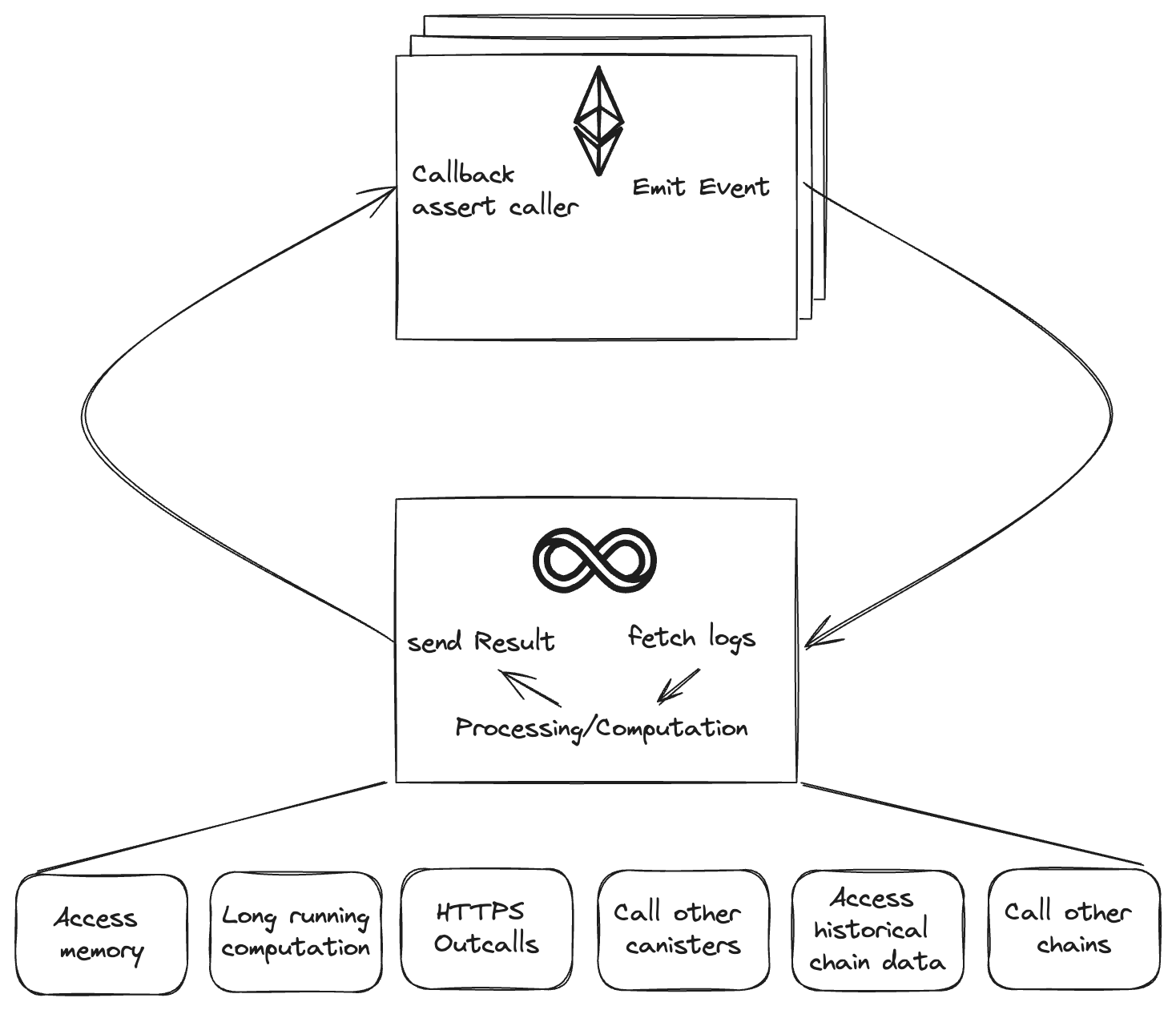9: Sample starter projects
Chain Fusion starter
The Chain Fusion starter project combines several key features of ICP in one boilerplate template. It focuses on ICP's Ethereum and EVM integration through the EVM RPC canister and demonstrates how ICP canisters can be used as coprocessors to process events emitted by smart contracts deployed on an EVM chain.
ICP canister smart contracts can read information from EVM smart contracts in a secure manner through HTTPS outcalls or using the EVM RPC canister. Then, to submit transactions to and write to other chains, ICP uses chain-key signatures, i.e., Threshold ECDSA.
These features eliminate the need for a bridge or other third-party to relay messages between ICP and another network. No extra work is needed from the EVM chain, either, as the EVM smart contract only needs to verify that the sender is correct.

This starter project is a proof of concept and should not be used in production environments.
This project uses two canisters:
evm_rpc: An instance of the EVM RPC canister used to obtain information from an EVM chain.chain_fusion: A canister that acts as a coprocessor and listens to events emitted by the EVM smart contract, then processes them and sends the results back to the smart contract.
Prerequisites
If you are installing this project locally, download and install the following tools:
Deploying the starter project
To deploy this project, the simplest way is to use GitHub Codespaces or a Developer Container.
GitHub Codespaces is a cloud-based option, whereas a Dev Container relies on Docker and VS Code being installed locally.
Alternatively, you can run the project locally by installing the dependencies above, then running the following commands:
git clone https://github.com/letmejustputthishere/chain-fusion-starter.git
cd chain-fusion-starter
./deploy.sh
The deploy.sh script starts the anvil and dfx processes, deploys the EVM smart contract, then generates a number of jobs that the smart contract will process. Lastly, it deploys the chain_fusion canister to listen for events from that smart contract.
View the full source code for this project.
Creating an NFT collection
Another boilerplate project is the icrc7_nft project, which uses Motoko and Mops packages to deploy an NFT collection using the ICRC-3, ICRC-7, and ICRC-37 standards, and a single canister called icrc7 that deploys the collection.
ICRC-3: The standard for transaction logs and archives.
ICRC-7: The base non-fungible token standard. Read more about the ICRC-7 standard.
ICRC-37: An extension of ICRC-7 that enables an 'approve' functionality. Read more about the ICRC-37 standard.
Prerequisites
If you are installing this project locally, download and install the following tools:
- dfx
>= 0.18
Download the project
Setup the project locally by running the following commands:
git clone https://github.com/PanIndustrial-Org/icrc_nft.mo/tree/main
cd icrc_nft/example
./deploy.sh
The deploy.sh script executes the following actions:
Creates the identities
aliceandbob, then sets environment variables for each.Sets an environment variable for the admin principal.
Deploys the
icrc7canister with the init args ofnullfor each standard.Initializes the canister by calling the
initmethod.Mints 4 NFTs.
Calls each of the canister's methods to get information about the collection.
Transfers a token from the canister to the admin identity.
Approves the
aliceidentity to spend a token, then hasalicetransfer the token tobob.Approve
bobto transfer a token, then revoke the approval.Returns the transfer and archive logs.
The commands used for each action can be found in the example/deploy.sh script.
View the full source code for this project.